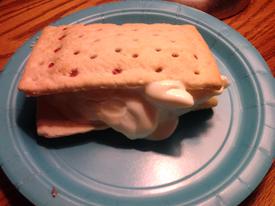We are pleased to announce that on March 4, 2025, an updated Rich Text Editor will be introduced in the MyFitnessPal Community. To learn more about the upcoming changes, please click here. We look forward to sharing this new feature with you!
Costa Rican Food

Poison5119
Posts: 1,460 Member
Thought this was interesting.
Costa Rican cuisine does not have distinct or original styles to call its own. It is a combination of Spanish, American, Caribbean and Southern American influences. This style of cuisine is shared by most of Central America, although local variations have appeared in each of the country.
A national dish is Gallo Pinto ("spotted rooster"), although the name has no relation to the ingredients). It is mainly a combination of black beans and white rice, and it is spiced with cilantro, onions, garlic, salt and a local condiment called Salsa Lizano(if you want). It is typically eaten at breakfast with eggs, and/or natilla (sour cream). Fried plantains and either corn tortillas or bread, are also common. Gallo pinto is a common and typical dish in both Costa Rica and Nicaragua, being widely consumed in both countries the origin of the dish has been debated for many years.
Another typical dish is "Arroz con pollo" ("rice with chicken"). This dish basically consists of bite size chicken chunks mixed with rice and diced vegetables that include carrots, peas, corn and garbanzo beans (chickpeas).
"Olla de Carne" is another typical dish which is mainly prepared on weekends. It is basically a broth corn prepared by boiling water, meat and whole-to large sized vegetable pieces, with spices. Eating the soup usually requires a bowl with the broth, and separate plates for the vegetables and rice. Because preparation of the vegetables is tiresome and the size of the plate obligates using a large pot, it is prepared for family meetings and was usually prepared on Sundays after church.
"Casados" are also a typical dish. A casado is basically a one-plate meal, that at least includes black beans, rice, a meat and one or more side dishes. The meat can vary from chicken or beef, fish, tongue, liver, or hamburger patties. The side dishes can range from pasta salads, vegetable salads, fried eggs, potatoes, spaghetti, or "barbudos" (green beans wrapped in egg batter). Finally most casados include fried plantains.
A very common practice when sitting down to eat is to drink a fruit drink of some kind. These are called ("refrescos", "frescos", "refriscos naturales" or "batidos"(smoothies)). They are made with either water or milk and come in an endless variety: canteloupe, strawberry, tamarind, mango, papaya, lemon, blackberry (mora), guanabana, fruit punch, horchata, and a local favorite, cas.
Finally, there are some important regional differences. The Caribbean side of the country, because of its roots, enjoys Gallo pinto but adding Coconut oil. This is called "Rice an' Beans". This region also has "Pati", "Plantain tarts", "Rondon" and "Pan bon". The north-western part of the country, has a strong tendency towards corn products and is famous for large, cheese filled tortillas, corn snacks and other dishes.
Costa Rican cuisine does not have distinct or original styles to call its own. It is a combination of Spanish, American, Caribbean and Southern American influences. This style of cuisine is shared by most of Central America, although local variations have appeared in each of the country.
A national dish is Gallo Pinto ("spotted rooster"), although the name has no relation to the ingredients). It is mainly a combination of black beans and white rice, and it is spiced with cilantro, onions, garlic, salt and a local condiment called Salsa Lizano(if you want). It is typically eaten at breakfast with eggs, and/or natilla (sour cream). Fried plantains and either corn tortillas or bread, are also common. Gallo pinto is a common and typical dish in both Costa Rica and Nicaragua, being widely consumed in both countries the origin of the dish has been debated for many years.
Another typical dish is "Arroz con pollo" ("rice with chicken"). This dish basically consists of bite size chicken chunks mixed with rice and diced vegetables that include carrots, peas, corn and garbanzo beans (chickpeas).
"Olla de Carne" is another typical dish which is mainly prepared on weekends. It is basically a broth corn prepared by boiling water, meat and whole-to large sized vegetable pieces, with spices. Eating the soup usually requires a bowl with the broth, and separate plates for the vegetables and rice. Because preparation of the vegetables is tiresome and the size of the plate obligates using a large pot, it is prepared for family meetings and was usually prepared on Sundays after church.
"Casados" are also a typical dish. A casado is basically a one-plate meal, that at least includes black beans, rice, a meat and one or more side dishes. The meat can vary from chicken or beef, fish, tongue, liver, or hamburger patties. The side dishes can range from pasta salads, vegetable salads, fried eggs, potatoes, spaghetti, or "barbudos" (green beans wrapped in egg batter). Finally most casados include fried plantains.
A very common practice when sitting down to eat is to drink a fruit drink of some kind. These are called ("refrescos", "frescos", "refriscos naturales" or "batidos"(smoothies)). They are made with either water or milk and come in an endless variety: canteloupe, strawberry, tamarind, mango, papaya, lemon, blackberry (mora), guanabana, fruit punch, horchata, and a local favorite, cas.
Finally, there are some important regional differences. The Caribbean side of the country, because of its roots, enjoys Gallo pinto but adding Coconut oil. This is called "Rice an' Beans". This region also has "Pati", "Plantain tarts", "Rondon" and "Pan bon". The north-western part of the country, has a strong tendency towards corn products and is famous for large, cheese filled tortillas, corn snacks and other dishes.
0
Replies
-
Thought this was interesting.
Costa Rican cuisine does not have distinct or original styles to call its own. It is a combination of Spanish, American, Caribbean and Southern American influences. This style of cuisine is shared by most of Central America, although local variations have appeared in each of the country.
A national dish is Gallo Pinto ("spotted rooster"), although the name has no relation to the ingredients). It is mainly a combination of black beans and white rice, and it is spiced with cilantro, onions, garlic, salt and a local condiment called Salsa Lizano(if you want). It is typically eaten at breakfast with eggs, and/or natilla (sour cream). Fried plantains and either corn tortillas or bread, are also common. Gallo pinto is a common and typical dish in both Costa Rica and Nicaragua, being widely consumed in both countries the origin of the dish has been debated for many years.
Another typical dish is "Arroz con pollo" ("rice with chicken"). This dish basically consists of bite size chicken chunks mixed with rice and diced vegetables that include carrots, peas, corn and garbanzo beans (chickpeas).
"Olla de Carne" is another typical dish which is mainly prepared on weekends. It is basically a broth corn prepared by boiling water, meat and whole-to large sized vegetable pieces, with spices. Eating the soup usually requires a bowl with the broth, and separate plates for the vegetables and rice. Because preparation of the vegetables is tiresome and the size of the plate obligates using a large pot, it is prepared for family meetings and was usually prepared on Sundays after church.
"Casados" are also a typical dish. A casado is basically a one-plate meal, that at least includes black beans, rice, a meat and one or more side dishes. The meat can vary from chicken or beef, fish, tongue, liver, or hamburger patties. The side dishes can range from pasta salads, vegetable salads, fried eggs, potatoes, spaghetti, or "barbudos" (green beans wrapped in egg batter). Finally most casados include fried plantains.
A very common practice when sitting down to eat is to drink a fruit drink of some kind. These are called ("refrescos", "frescos", "refriscos naturales" or "batidos"(smoothies)). They are made with either water or milk and come in an endless variety: canteloupe, strawberry, tamarind, mango, papaya, lemon, blackberry (mora), guanabana, fruit punch, horchata, and a local favorite, cas.
Finally, there are some important regional differences. The Caribbean side of the country, because of its roots, enjoys Gallo pinto but adding Coconut oil. This is called "Rice an' Beans". This region also has "Pati", "Plantain tarts", "Rondon" and "Pan bon". The north-western part of the country, has a strong tendency towards corn products and is famous for large, cheese filled tortillas, corn snacks and other dishes.0 -
 0
0 -
Lizano sauce is amazing. I always have some in my fridge. The portions are huge in CR. Most people have pretty active lifestyles there.0
-
1. I *love* horchata.
2. Tracked down a Gallo Pinto recipe:
http://www.food.com/recipe/gallo-pinto-costa-rican-rice-and-beans-787470
This discussion has been closed.
Categories
- All Categories
- 1.4M Health, Wellness and Goals
- 394.3K Introduce Yourself
- 44K Getting Started
- 260.4K Health and Weight Loss
- 176.1K Food and Nutrition
- 47.5K Recipes
- 232.7K Fitness and Exercise
- 440 Sleep, Mindfulness and Overall Wellness
- 6.5K Goal: Maintaining Weight
- 8.6K Goal: Gaining Weight and Body Building
- 153.1K Motivation and Support
- 8.1K Challenges
- 1.3K Debate Club
- 96.4K Chit-Chat
- 2.5K Fun and Games
- 4K MyFitnessPal Information
- 16 News and Announcements
- 1.2K Feature Suggestions and Ideas
- 2.7K MyFitnessPal Tech Support Questions


